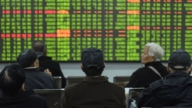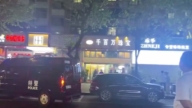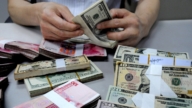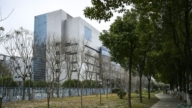【新唐人2013年12月23日訊】近幾天,中國銀行間資金面再度上演風雲突變,關鍵期限資金利率創六月份錢荒以來新高,開始中共央行堅持不公開放水,再度的錢荒導致市場一度恐慌,迫使央行不得不採取緊急救市措施,向亟需資金的銀行提供信貸。外界認為,儘管中共總理李克強想讓中國經濟走向正軌,然而失血過多的中共金融體系,以及金融崩潰可能引發的全面危機,迫使當局不得不再度介入。專家指出,錢荒的反覆出現,體現出了中國經濟的真實情況。
從12月17號開始,中共銀行間線上資金利率就開始出現跳躍性上漲,18號,銀行間利率再度上升,線上資金利率終於向線下看齊,銀行間7天質押式回購加權平均利率,收漲152個基點於6.3772%,盤中最高成交利率更是高達7.5%,創下今年6月25號錢荒以來的新高。19號早些時候,貨幣市場利率再次飆升,中國短期流動性的關鍵指標——7天期質押式回購利率——升到近10%。
這次流動性驟緊與11月中下旬時的一輪緊張行情如出一轍。11月15號,線上7天資金利率單日飆升117個基點,而這次7天資金利率飆升152個基點也僅在一個交易日內完成。
大陸金融投資顧問鄭志遙:「這就是真實的東西,報表啊,造假都掩蓋不住的問題,這才是真相。」
不過直到19號早些時候,7天期質押式回購利率升到近10%,央行繼續在公開市場維持零操作,堅持不公開放水。稍後,中共人民銀行公開聲稱,它已通過「短期流動性調節工具」(SLO),向亟需資金的銀行提供了信貸。
中華經濟研究院教授吳惠林:「這證明中國的金融(問題)非常的嚴重,不只是地方債還有企業債的問題,這些問題都隱藏在後面,全面銀行崩潰的話,問題就非常嚴重,萬箭齊發的話,那就很慘。」
鄭志遙:「銀行體系是我們政府的命根子,戳出來大的窟窿,或暴露出大的問題,都是最後央媽來買單,所以央媽必須要大家過緊日子,要真是過不下去了,那還是要拉一把,不管你的話麻煩很大。」
不過央行的這次操作不同尋常。根據央行自己的規則,它應當在實施SLO操作的一個月後才予以宣佈,但這一次沒有遲延。下午央行利用新浪微博官網,告訴市場:它已向相關銀行提供了緊急資金。
央行還將中國銀行間市場交易延長了30分鐘,讓金融機構有更多時間獲得資金。央行上一次延長交易時間是在6月「錢荒」期間。
吳惠林:「說明這個事情非常緊急,原來就發生錢荒了,現在美國的QE又要退場,大家預期資金又要流回美國的時候,就雪上加霜,央行就祭出一些手段,穩住人們的心理,不然原來這個失血的這錢荒只會更加嚴重,那你說是要短痛還是長期的痛。」
中共國務院總理李克強上任以來,一直強調深化金融改革,曾經強調央行不再像以前那樣放水救市,不過6月錢荒和11月錢荒出現時,央行還是照舊放水。
央行表示,如果有必要的話,央行以後還會根據財政支出進度情況,繼續向符合條件金融機構,通過SLO提供流動性支持。
鄭志遙:「特殊情況下的應急預案,讓大家都好好的,但是從根本上還要靠你自己來解決,只能是治標,不能用救火的方式來當作我們的常態。」
大陸金融投資顧問鄭志遙一再強調,市場規律是無情,政府干預太多,自會受到市場規律的懲罰。鄭志遙說,股票是經濟的晴雨表,股票指數在12月大多數時候持續下跌,滬深300指數在過去11個交易日下跌5.5%。
19號,「美聯儲」宣佈明年初退出代表貨幣量化寬鬆政策的QE。中華經濟研究院教授吳惠林指出,這會導致更多的熱錢流回美國,中國的經濟將面臨更嚴峻的考驗。
採訪編輯/劉惠 後製/孫寧
Numbers Don’t Lie: Bank Runs Force China’s Central Bank to Intervene
China’s inter-bank funding has again been in turmoil.
The key term funding rates reached a record high.
At first, the Central Bank did not loosen
its policies until there was a bank run.
Subsequently, the Central Bank had to take emergency
action, to give loans to banks that needed it most.
Premier Li Keqiang has prioritized China’s economy.
However, this already ailing economy
is facing a full-blown bankruptcy crisis.
The Central Bank has again intervened in the market.
Experts point out that the repetition of bank runs
demonstrates the realities of China’s economy.
Since December 17, the inter-bank online
fund rates have been escalating in China.
On December 18, the inter-bank rate shot up again,
and the online fund rates are emulating offline rates.
The inter-bank 7 day repurchase weighted average
interest rate increased 152 basis points, reaching 6.3772%.
The highest quoted bid was a
record high since June 25, at 7.5%.
Early on December 19, the money market rate soared again.
The key indicator of short-term liquidity, the inter-bank 7 day
repurchase weighted average interest rate was almost 10%.
The liquidity squeeze is no different
from that in mid to late November.
On November 15, the inter-bank 7 day repurchase weighted
average interest rate increased by 117 basis points.
Whereas, this time it shot up 152
basis points within one trading day.
Zheng Zhiyao, Financial Investment Advisor
in China: “This is the truth that financial reports
or bogus data can’t conceal. It is the real truth.”
Up until early December 19, the inter-bank 7 days repurchase
weighted average interest rate rose to almost 10%.
Nevertheless, the Central Bank didn’t take action
in the public market, in order to lower the rates.
The People’s Bank of China then made a public declaration.
It has loaned to the banks that need cash
most via short-term liquidity operations.
Wu Huilin, Professor, Chung-Hua Institution for
Economic Research, “It proves there are tremendous
and serious problems in China’s financial market.
Those problems are not only around municipals or corporate
bonds. Actually, the real problem is hiding behind the scenes.
If banks in China go bankrupt altogether, it’ll be disastrous.”
Zheng Zhiyao: “The banking system
is the lifeblood of a government.
If there are any holes or problems in that system,
the central bank would have to pay the price.
The central bank is asking its people to lead a thrifty life now.
Even if it knows it’s really hard to pull through,
it’ll still want to struggle a little bit longer.
Otherwise, the consequences will be severe.”
However, it is deemed very unusual for a central bank
to notify the public about its operations immediately.
According to its own rules, the central bank can
only announce it one month after the SLO operation.
On the afternoon of December 19, the Central Bank
posted on its sina official blog that it has already
loaned to those banks that need cash urgently.
The Central Banks also prolonged the
inter-bank market trading time by 30 minutes.
This was meant to enable the financial
structures to have enough time to obtain funds.
The last time this happened was June this year, when the
Central Bank had to prolong trading times during a bank run.
Wu Huilin: “The immediate announcement from
the Central Banks indicates a case of emergency.
A bank run has taken place before.
Now, the United States is exiting
from ‘ Quantitative Easing’ (QE) policy.
When people expect more capital will flow
back into the States, it makes it even worse.
That’s why the Central Bank played
some tricks to calm people’s minds.
Otherwise, the situation of bank runs can only become
worse. It’s only a question of long-term or short-term pain.”。
Since Premier Li Keqiang took office, he
has been promoting financial reforms.
He has emphasized that the Central Bank shouldn’t save
the market by loosening policies, as it has done in the past.
However, when bank runs took place in June and
November, the Central Bank still played these old tricks.
The Central Bank claimed that it will continue providing help
to qualified financial structures via SLO if it’s necessary.
This flexibility will be based on its fiscal expenditure schedule.
Zheng Zhiyao: “In special situations, the Central Bank
can solve some problems with contingent plans.
However, the root problems have to be solved.
It can’t work on trying to put out fires every day.”
Zheng Zhiyao repeatedly stressed that
the financial market principles are merciless.
If the government intervenes too much,
it’ll get punished by the market principles.
Zheng Zhiyao said that the stock market
performance is the barometer of an economy.
In December, stock indices keep decreasing. Hushen 300
Index has decreased by 5.5% within the past 11 trading days.
On December 19, the US “Federal Reserve” announced
it will exit from the QE (Quantitative Easing) monetary policy.
This will cause a lot more cash to flow back into the States.
Thus, the economy in China will face more severe challenges.
Interview & Edit/LiuHui Post-Production/SunNing


























